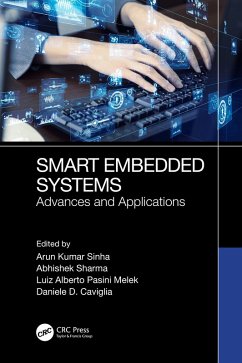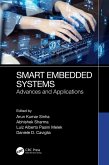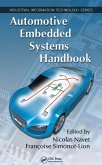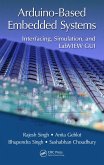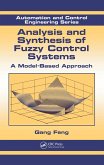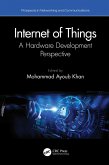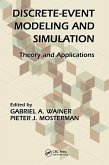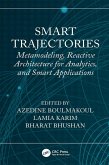Smart Embedded Systems (eBook, PDF)
Advances and Applications
Redaktion: Sinha, Arun; Caviglia, Daniele; Pasini Melek, Luiz Alberto; Sharma, Abhishek
50,95 €
50,95 €
inkl. MwSt.
Sofort per Download lieferbar

25 °P sammeln
50,95 €
Als Download kaufen

50,95 €
inkl. MwSt.
Sofort per Download lieferbar

25 °P sammeln
Jetzt verschenken
Alle Infos zum eBook verschenken
50,95 €
inkl. MwSt.
Sofort per Download lieferbar
Alle Infos zum eBook verschenken

25 °P sammeln
Smart Embedded Systems (eBook, PDF)
Advances and Applications
Redaktion: Sinha, Arun; Caviglia, Daniele; Pasini Melek, Luiz Alberto; Sharma, Abhishek
- Format: PDF
- Merkliste
- Auf die Merkliste
- Bewerten Bewerten
- Teilen
- Produkt teilen
- Produkterinnerung
- Produkterinnerung

Bitte loggen Sie sich zunächst in Ihr Kundenkonto ein oder registrieren Sie sich bei
bücher.de, um das eBook-Abo tolino select nutzen zu können.
Hier können Sie sich einloggen
Hier können Sie sich einloggen
Sie sind bereits eingeloggt. Klicken Sie auf 2. tolino select Abo, um fortzufahren.

Bitte loggen Sie sich zunächst in Ihr Kundenkonto ein oder registrieren Sie sich bei bücher.de, um das eBook-Abo tolino select nutzen zu können.
"Smart Embedded Systems: Advances and Applications" is a comprehensive guide that demystifies the complex world of embedded technology.
- Geräte: PC
- ohne Kopierschutz
- eBook Hilfe
- Größe: 68.78MB
Andere Kunden interessierten sich auch für
![Smart Embedded Systems (eBook, ePUB) Smart Embedded Systems (eBook, ePUB)]() Smart Embedded Systems (eBook, ePUB)50,95 €
Smart Embedded Systems (eBook, ePUB)50,95 €![Automotive Embedded Systems Handbook (eBook, PDF) Automotive Embedded Systems Handbook (eBook, PDF)]() Automotive Embedded Systems Handbook (eBook, PDF)196,95 €
Automotive Embedded Systems Handbook (eBook, PDF)196,95 €![Arduino-Based Embedded Systems (eBook, PDF) Arduino-Based Embedded Systems (eBook, PDF)]() Rajesh SinghArduino-Based Embedded Systems (eBook, PDF)46,95 €
Rajesh SinghArduino-Based Embedded Systems (eBook, PDF)46,95 €![Analysis and Synthesis of Fuzzy Control Systems (eBook, PDF) Analysis and Synthesis of Fuzzy Control Systems (eBook, PDF)]() Gang FengAnalysis and Synthesis of Fuzzy Control Systems (eBook, PDF)118,95 €
Gang FengAnalysis and Synthesis of Fuzzy Control Systems (eBook, PDF)118,95 €![Internet of Things (eBook, PDF) Internet of Things (eBook, PDF)]() Internet of Things (eBook, PDF)50,95 €
Internet of Things (eBook, PDF)50,95 €![Discrete-Event Modeling and Simulation (eBook, PDF) Discrete-Event Modeling and Simulation (eBook, PDF)]() Discrete-Event Modeling and Simulation (eBook, PDF)89,95 €
Discrete-Event Modeling and Simulation (eBook, PDF)89,95 €![Smart Trajectories (eBook, PDF) Smart Trajectories (eBook, PDF)]() Smart Trajectories (eBook, PDF)50,95 €
Smart Trajectories (eBook, PDF)50,95 €-
-
-
"Smart Embedded Systems: Advances and Applications" is a comprehensive guide that demystifies the complex world of embedded technology.
Dieser Download kann aus rechtlichen Gründen nur mit Rechnungsadresse in A, B, BG, CY, CZ, D, DK, EW, E, FIN, F, GR, HR, H, IRL, I, LT, L, LR, M, NL, PL, P, R, S, SLO, SK ausgeliefert werden.
Produktdetails
- Produktdetails
- Verlag: Taylor & Francis
- Seitenzahl: 298
- Erscheinungstermin: 1. Dezember 2023
- Englisch
- ISBN-13: 9781003810261
- Artikelnr.: 69417911
- Verlag: Taylor & Francis
- Seitenzahl: 298
- Erscheinungstermin: 1. Dezember 2023
- Englisch
- ISBN-13: 9781003810261
- Artikelnr.: 69417911
Dr Arun Kumar Sinha received his PhD in electronic engineering from the University of Genova, Genova, Italy, in 2013. He has 10 years' experience in industry and teaching at Agilent Technologies (Gurugram, India), Netaji Subhas Institute of Technology (New Delhi, India), Jaypee Institute of Information Technology (Noida, India), and Mekelle University (Mekelle, Ethiopia), and post-doctoral research experience at Federal University of Santa Catarina (Florianopolis, Brazil). Currently, he is working as an associate professor at VIT-AP University, Andhra Pradesh, India. Among the subjects he has taught are digital logic and microprocessors (undergraduate students, UG), fundamentals of electrical and electronics engineering (UG), principles of electrical engineering (UG), VLSI system design (UG), analog VLSI design (UG), analog IC design (postgraduate students, PG), and analog devices and circuits (UG), process dynamics and multivariable control (PG), real-time control and embedded systems (PG), electrical machines and instruments (UG), basic electronics device and circuits (UG), electronic instruments and measurement (UG), principles of electrical engineering (UG), biomedical instrumentation (UG), and electrical measurements (UG). He is the author of 35 papers in international journals/conferences, one conference proceedings as editor, and three patents. He is a member of the Hyderabad section of the IEEE, India. His research interests include intelligent algorithms, integrated circuit design, digital and analog VLSI, semiconductor devices, and mathematical modeling. Dr Abhishek Sharma received his BE in electronics engineering from Jiwaji University, Gwalior, India, and a PhD in engineering from the University of Genoa, Italy. He is presently working as an assistant professor in the Department of Electronics and Communication Engineering at The LNM Institute of Information and Technology, Jaipur, RJ, India, where he also coordinates the ARM University partner program, Texas Instruments Lab, and Intel Intelligent Lab. He is the center lead of LNMIIT's Center of Smart Technology (L-CST). He is a member of the IEEE, the Computer Society and Consumer Electronics Society, a Lifetime Member of the Indian Society forTechnical Education (ISTE), a Lifetime Member of the Advanced Computing Society(ACS), India, and a Life Member of the Computer Society of India (CSI). He is also Membership Secretary of IEEE CTSoC, Application-specific CE for Smart Cities (SMC). He has taught microprocessors and interface, the internet of things and embedded systems at undergraduate level, and applied machine learning and system on chip at postgraduate level. His research interests are real-time systems and embedded systems. Dr Luiz Alberto Pasini Melek received his BE in electronic engineering (cum laude) from the Federal University of Paraná (UFPR), Curitiba, Brazil, in 1998. He holds a Diploma in Telecommunications, 2001, and a Diploma in Embedded Systems Design, 2014. He received his MS degree in 2004, and PhD in 2017, both from the Federal University of Santa Catarina (UFSC), Brazil. In 2015-16 he was a professor in the Electrical Engineering Department of UFPR, where he taught classes in basic electronics, analog filters, laboratory of electronics, and laboratory of electricity. He has more than 20 years of experience in industry and since 2017 he has worked as a hardware specialist engineer at Pumatronix, Curitiba, Brazil. He has designed both hardware and firmware for applications such as embedded systems, automotives, telecommunications, metering, and agriculture. He has authored or co-authored 14 papers in international journals and conferences, and works as a volunteer. He is a reviewer for the journals IEEE Transactions on Circuits and Systems I: Regular Papers, IEEE Transactions on Circuits and Systems II: Express Briefs, IEEE Transactions on Device and Materials Reliability, and World Journal of Engineering. His main interests are ultra-low voltage digital and mixed-signal circuits for VLSI, and the development of embedded systems for a broad range of applications. Prof. Daniele D. Caviglia graduated in electronic engineering and specialized in computer engineering at the University of Genoa, Italy, in 1980 and 1982, respectively. In 1983, he joined the Institute of Electrical Engineering, University of Genoa, as Assistant Professor of Electronics. Since 1984, he has been with the Department of Biophysical and Electronic Engineering (DIBE), as associate professor from 1992 and as full professor since 2000. From 2002 to 2008, he was the Director of DIBE. He is currently with the Department of Electrical, Electronics and Telecommunications Engineering and Naval Architecture (DITEN), University of Genoa, teaching postgraduate courses in electronic systems for telecommunications, distributed electronic systems and technologies for environmental monitoring and integrated electronics, and electronic systems laboratory undergraduate courses. He is also active in the development of innovative solutions for environmental monitoring for civil protection and security applications. His research interests include the design of electronic circuits and systems for telecommunications, electronic equipment for health and safety, and energy harvesting techniques for internet of things (IoT) applications. He is a Life Member of the IEEE.
Chapter 1
A reconfigurable FPGA based epileptic seizures detection system with 144 µs
detection time
Swetha Annangi and Arun Kumar Sinha
Chapter 2
Hardware architecture for denoising of EOG signal using differential
evolution algorithm V. H. Prasad Reddy, Gundugonti Kishore Kumar and Puli
Kishore Kumar
Chapter 3
Implementation considerations for an intelligent embedded e-Health system
and experimental results for EEG-based activity recognition
Stefan Oniga, Iuliu Alexandru Pap and Tamas Majoros
Chapter 4
Embedded and computational intelligence for diabetic healthcare: An
overview
Anupama Namburu Aravapalli Rama Satish Bhanu Teja Veeramachaneni, Sneha
Edupuganti
Kothamasu Venkata Naga Durga Sai Harshith
Chapter 5
A semi-definite programming based design of a robust depth control for a
submersible autonomous robot through state feedback control
Vadapalli Siddhartha and Subhasish Mahapatra
Chapter 6
Embedded system with in-memory compute neuromorphic accelerator for
multiple applications
Afroz Fatima and Abhijit Pethe
Chapter 7
Artificial intelligence driven radio channel capacity in 5G, 6G wireless
communication system in the presence of vegetation: Prospect and challenges
Sachin Kumar, T. Senthil Siva Subramanian and Kapil Sharma
Chapter 8
Smart cabin for office using embedded systems and sensors
Anirban Dasgupta, Abhranil Das, parishmita Deka and Soham Das
Chapter 9
Wireless protocols for swarm of sensors: Sigfox, Lorawan, and Nb-IoT
Luiz Alberto Pasini Melek
Chapter 10
Design and test of thermal energy harvester for self-powered autonomous
electronic load
Arun Kumar Sinha
Chapter 11
Managing concept drift in IoT health data streams: A dynamic adaptive
weighted ensemble approach
M. Geetha Pratyusha and Arun Kumar Sinha
Chapter 12
GraLSTM: A distributed learning model for efficient IoT resource allocation
in healthcare M. Geetha Pratyusha and Arun Kumar Sinha
A reconfigurable FPGA based epileptic seizures detection system with 144 µs
detection time
Swetha Annangi and Arun Kumar Sinha
Chapter 2
Hardware architecture for denoising of EOG signal using differential
evolution algorithm V. H. Prasad Reddy, Gundugonti Kishore Kumar and Puli
Kishore Kumar
Chapter 3
Implementation considerations for an intelligent embedded e-Health system
and experimental results for EEG-based activity recognition
Stefan Oniga, Iuliu Alexandru Pap and Tamas Majoros
Chapter 4
Embedded and computational intelligence for diabetic healthcare: An
overview
Anupama Namburu Aravapalli Rama Satish Bhanu Teja Veeramachaneni, Sneha
Edupuganti
Kothamasu Venkata Naga Durga Sai Harshith
Chapter 5
A semi-definite programming based design of a robust depth control for a
submersible autonomous robot through state feedback control
Vadapalli Siddhartha and Subhasish Mahapatra
Chapter 6
Embedded system with in-memory compute neuromorphic accelerator for
multiple applications
Afroz Fatima and Abhijit Pethe
Chapter 7
Artificial intelligence driven radio channel capacity in 5G, 6G wireless
communication system in the presence of vegetation: Prospect and challenges
Sachin Kumar, T. Senthil Siva Subramanian and Kapil Sharma
Chapter 8
Smart cabin for office using embedded systems and sensors
Anirban Dasgupta, Abhranil Das, parishmita Deka and Soham Das
Chapter 9
Wireless protocols for swarm of sensors: Sigfox, Lorawan, and Nb-IoT
Luiz Alberto Pasini Melek
Chapter 10
Design and test of thermal energy harvester for self-powered autonomous
electronic load
Arun Kumar Sinha
Chapter 11
Managing concept drift in IoT health data streams: A dynamic adaptive
weighted ensemble approach
M. Geetha Pratyusha and Arun Kumar Sinha
Chapter 12
GraLSTM: A distributed learning model for efficient IoT resource allocation
in healthcare M. Geetha Pratyusha and Arun Kumar Sinha
Chapter 1
A reconfigurable FPGA based epileptic seizures detection system with 144 µs
detection time
Swetha Annangi and Arun Kumar Sinha
Chapter 2
Hardware architecture for denoising of EOG signal using differential
evolution algorithm V. H. Prasad Reddy, Gundugonti Kishore Kumar and Puli
Kishore Kumar
Chapter 3
Implementation considerations for an intelligent embedded e-Health system
and experimental results for EEG-based activity recognition
Stefan Oniga, Iuliu Alexandru Pap and Tamas Majoros
Chapter 4
Embedded and computational intelligence for diabetic healthcare: An
overview
Anupama Namburu Aravapalli Rama Satish Bhanu Teja Veeramachaneni, Sneha
Edupuganti
Kothamasu Venkata Naga Durga Sai Harshith
Chapter 5
A semi-definite programming based design of a robust depth control for a
submersible autonomous robot through state feedback control
Vadapalli Siddhartha and Subhasish Mahapatra
Chapter 6
Embedded system with in-memory compute neuromorphic accelerator for
multiple applications
Afroz Fatima and Abhijit Pethe
Chapter 7
Artificial intelligence driven radio channel capacity in 5G, 6G wireless
communication system in the presence of vegetation: Prospect and challenges
Sachin Kumar, T. Senthil Siva Subramanian and Kapil Sharma
Chapter 8
Smart cabin for office using embedded systems and sensors
Anirban Dasgupta, Abhranil Das, parishmita Deka and Soham Das
Chapter 9
Wireless protocols for swarm of sensors: Sigfox, Lorawan, and Nb-IoT
Luiz Alberto Pasini Melek
Chapter 10
Design and test of thermal energy harvester for self-powered autonomous
electronic load
Arun Kumar Sinha
Chapter 11
Managing concept drift in IoT health data streams: A dynamic adaptive
weighted ensemble approach
M. Geetha Pratyusha and Arun Kumar Sinha
Chapter 12
GraLSTM: A distributed learning model for efficient IoT resource allocation
in healthcare M. Geetha Pratyusha and Arun Kumar Sinha
A reconfigurable FPGA based epileptic seizures detection system with 144 µs
detection time
Swetha Annangi and Arun Kumar Sinha
Chapter 2
Hardware architecture for denoising of EOG signal using differential
evolution algorithm V. H. Prasad Reddy, Gundugonti Kishore Kumar and Puli
Kishore Kumar
Chapter 3
Implementation considerations for an intelligent embedded e-Health system
and experimental results for EEG-based activity recognition
Stefan Oniga, Iuliu Alexandru Pap and Tamas Majoros
Chapter 4
Embedded and computational intelligence for diabetic healthcare: An
overview
Anupama Namburu Aravapalli Rama Satish Bhanu Teja Veeramachaneni, Sneha
Edupuganti
Kothamasu Venkata Naga Durga Sai Harshith
Chapter 5
A semi-definite programming based design of a robust depth control for a
submersible autonomous robot through state feedback control
Vadapalli Siddhartha and Subhasish Mahapatra
Chapter 6
Embedded system with in-memory compute neuromorphic accelerator for
multiple applications
Afroz Fatima and Abhijit Pethe
Chapter 7
Artificial intelligence driven radio channel capacity in 5G, 6G wireless
communication system in the presence of vegetation: Prospect and challenges
Sachin Kumar, T. Senthil Siva Subramanian and Kapil Sharma
Chapter 8
Smart cabin for office using embedded systems and sensors
Anirban Dasgupta, Abhranil Das, parishmita Deka and Soham Das
Chapter 9
Wireless protocols for swarm of sensors: Sigfox, Lorawan, and Nb-IoT
Luiz Alberto Pasini Melek
Chapter 10
Design and test of thermal energy harvester for self-powered autonomous
electronic load
Arun Kumar Sinha
Chapter 11
Managing concept drift in IoT health data streams: A dynamic adaptive
weighted ensemble approach
M. Geetha Pratyusha and Arun Kumar Sinha
Chapter 12
GraLSTM: A distributed learning model for efficient IoT resource allocation
in healthcare M. Geetha Pratyusha and Arun Kumar Sinha
